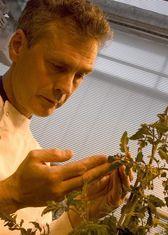
Scientists at Lancaster University have discovered a seed treatment that could increase crop resilience to pests.
Jasmonic acid (JA) is one of a plant’s natural defences against being eaten. When a bug takes a bite of one of its leaves, JA is one of the chemical signals that warn other leaves to mobilise their pest defences - making them difficult to digest.
It has long been understood that by spraying crops with JA, plants stand a better chance of repelling pests such as mites, caterpillars and aphids, but often grow less well.
Now, researchers at the Environment Centre of Lancaster University have found that plants grown from seeds first dipped in JA are also more pest-resilient, without any loss of growth.
Trials carried out at the centre’s research laboratories have had particularly promising results on tomato and capsicum. The potential financial advantage for growers is clear, as seeds would be far cheaper to treat than entire crops. It is another tool for growers to use as an alternative to using large amounts of pesticides or GM technologies.
Lead researcher Dr Nigel Paul, left, told FPJ: “This fits in alongside other aspects of integrated pest management in a grower’s armoury and as part of a wider strategy for those growers who aspire to pesticide-free production.”
In early trials at Lancaster University, the best results were on tomato plants, where attacks by red spider mites were reduced by 80 per cent, aphid attack was reduced by 60 per cent and caterpillar damage was down by a third.
With new funding from DEFRA, the team at Lancaster is developing further applications for the technology, including investigating its value in disease control.



